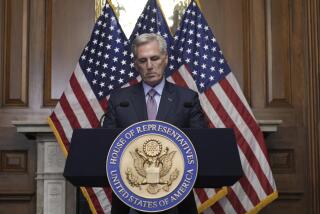THOUSAND OAKS : Beilenson Foe Blasts Closure of Office
- Share via
The candidate Rep. Anthony C. Beilenson (D-Woodland Hills) defeated last fall blasted the congressman Tuesday for his decision to close a Thousand Oaks field office.
“I find it very difficult to believe he would not cut elsewhere,” said Republican Richard Sybert, who narrowly lost to Beilenson and intends to challenge him again in 1996.
Sybert said that Beilenson should cut first his use of taxpayer-paid mailings to constituents.
Beilenson could not be reached for comment. But a spokesman for the congressional Franking Commission, which oversees taxpayer-paid mailings by members of the House of Representatives, said that the so-called “franking” budget can only be used on mailings.
Beilenson announced Monday that he would close his Thousand Oaks office this week to save about $25,000 a year in rent and maintenance.
Additional savings of about $75,000 a year will occur annually after two full-time jobs are cut from the congressman’s payroll and a third is reduced to part time, spokeswoman Kaye Davis said.
She also said that one of Beilenson’s remaining workers will be assigned to the Conejo Valley full time, and the congressman hopes to find a rent-free office in the area. Beilenson still maintains an office in Woodland Hills, about 15 miles from Thousand Oaks.
But Sybert said Beilenson “made a decision to abandon the Conejo Valley” because it voted 2-to-1 Republican last year. “Beilenson is simply punishing the Conejo Valley because it voted for me,” Sybert wrote in a letter to The Times.
Furthermore, Sybert said Beilenson spent $300,000 in 1993 on the taxpayer-paid mailings--including postage and worker time--and that cutbacks should be made there.
“Mr. Sybert’s number is probably out of line,” Davis said. She said Beilenson intends to cut his mailing costs by about $20,000 this year.
Davis could not provide exact mailing costs.
According to the National Taxpayers Union Foundation, Beilenson ranked among the top users of the franking privilege in Congress in 1993, when the congressman spent about $166,000.
Sybert said he factored in labor costs and other expenses not calculated by the Washington, D.C.-based taxpayers foundation when he concluded that Beilenson spent $300,000.
Beilenson, however, could not have used saved franking money to keep his Thousand Oaks office open, said Jack Dail of the Franking Commission.
“You can only transfer into the franking account,” Dail said. “You can’t transfer out.”
More to Read
Sign up for Essential California
The most important California stories and recommendations in your inbox every morning.
You may occasionally receive promotional content from the Los Angeles Times.













